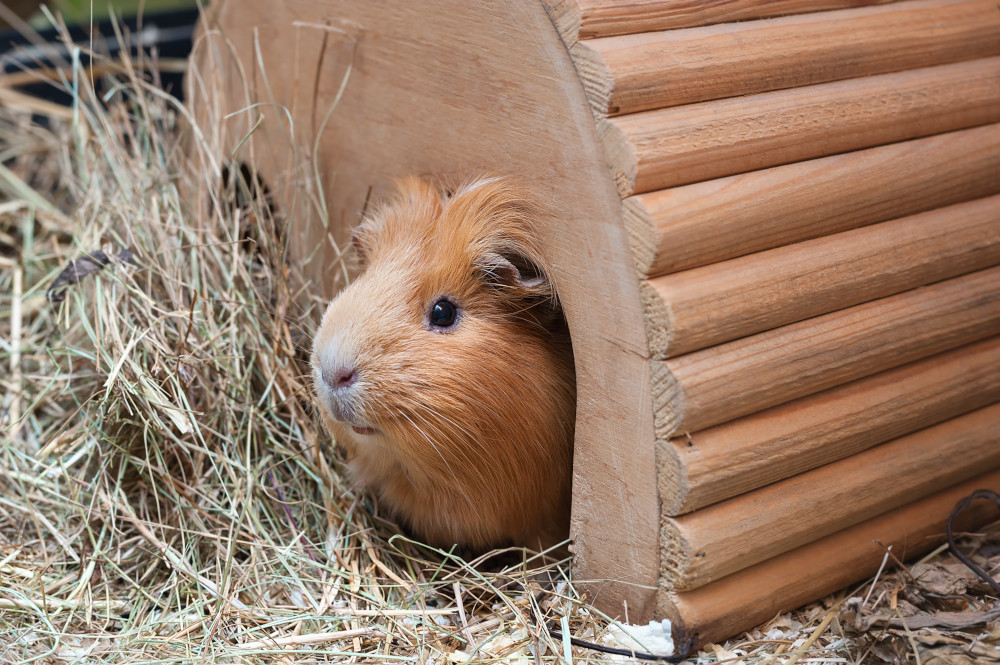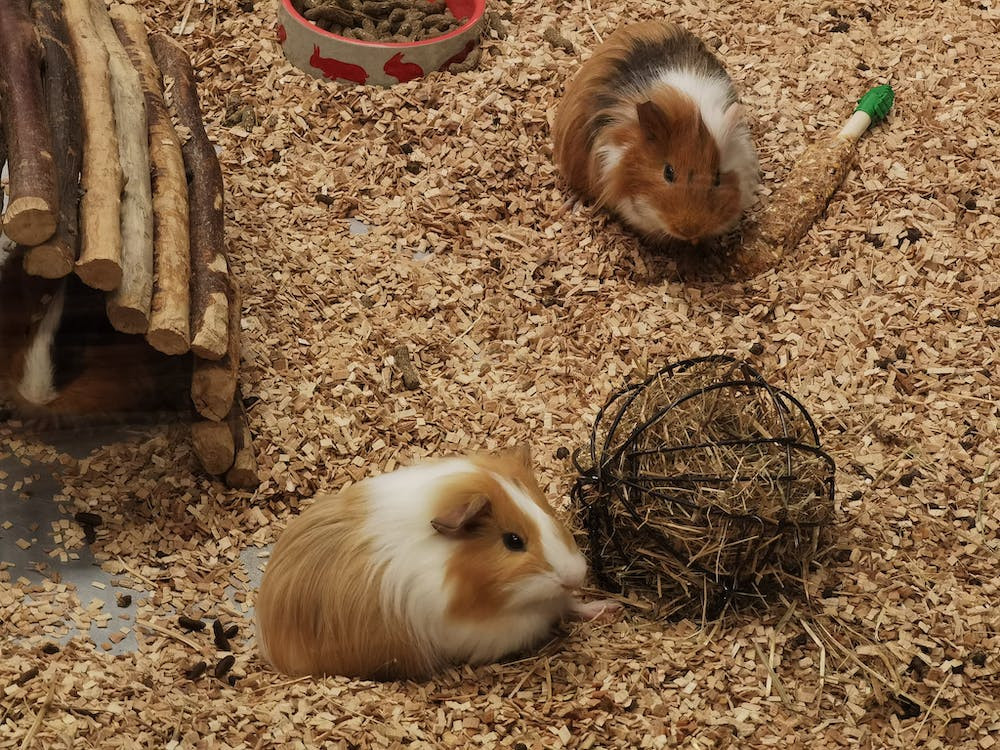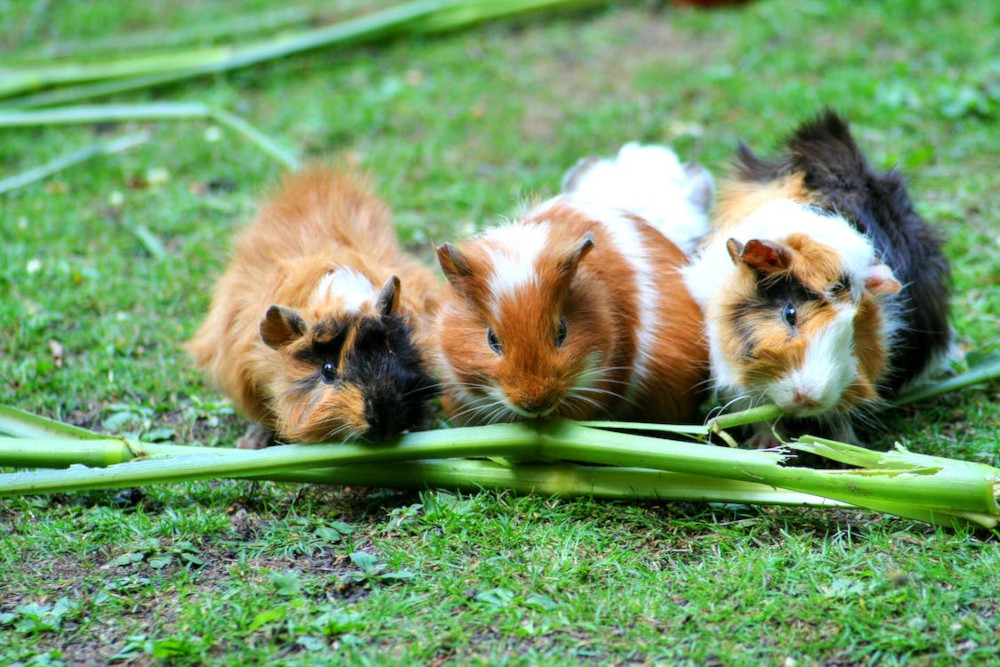
Your guinea pigs are herbivores, which means they eat only plant material.
Grass hay should be the high-fibre cornerstone of every guinea pig’s diet. The fibre in hay helps meet the important digestive health needs of herbivores such as guinea pigs. A daily recommended amount of a uniform, fortified food provides essential vitamins and minerals not found in hay. Fresh greens are also an important component of a guinea pig’s diet, and healthy treats can be beneficial when given in moderation.
Guinea pigs are also unique in that they need vitamin C added to their diet every day. Like people, guinea pigs cannot make their own vitamin C in their body, and so they need to eat foods high in vitamin C or take a daily supplement.
Like most herbivores, guinea pigs are essentially grazers. They eat all day! That means it’s important to keep fresh hay and grass available constantly.
Let’s look at their diet:
Hay
Your guinea pigs should have unlimited access to a variety of good quality grass hays. Among many benefits, hay helps prevent obesity, boredom, and dental and gastrointestinal disease. Since replacing the hay in your guinea pigs’ habitat can encourage picky eating, change it only when soiled. Young (less than six months old), pregnant, nursing, or ill animals can benefit from eating lucerne (alfalfa) hay in addition to grass hay because of the higher nutritional elements. Otherwise, alfalfa should only be given occasionally as a treat.

FAQs about hay
Why is hay so important to my guinea pig?
- Your guinea pigs’ teeth never stop growing. Hay is essential because it stimulates normal chewing and dental wear patterns which decrease the risk of dental disease.
- Hay is fermented in your guinea pigs’ caecum, a part of the intestinal tract. This fermentation results in the production of volatile fatty acids and vitamins, essential for your pets’ health.
What type of hay should I feed?
Grass hay should make up most of your guinea pigs’ daily diet. Offer a variety of hay to your guinea pigs to promote optimum health. Grass hays include Timothy hay, oat hay, orchard grass and lucerne (alfalfa) hay. Lucerne hay is higher in calcium than other hays (which can lead to kidney and bladder stones) and should be limited (or avoided) unless your guinea pigs are growing or pregnant.
Since hay is a natural product, each bag will look and feel different.
How much should I feed?
Generally, your guinea pig should be eating a pile of hay twice the size of their body daily.
Grass
Guinea pigs can safely eat grass, but there are some precautions that should be taken. Make sure that the grass isn’t contaminated with pesticides, chemicals, or urine from animals like cats or dogs. If your guinea pigs haven’t eaten grass before, you need to give them a little bit of it first and then slowly increase the amount until their digestive tract has adjusted to it.

Grass clippings from your lawn aren’t safe either for your guinea pigs. Besides containing chemicals, grass clippings undergo fermentation at a faster rate compared to fresh grass on the lawn, and this fermented grass can lead to bloating and other digestive issues. Feed only grass that has been hand-pulled or cut by hand.
Vegetables and fruit
Fresh vegetables and fruit are a vital part of your guinea pigs’ daily diet. They contribute to hydration and provide necessary vitamins and minerals, as well as enrichment.
They are great for encouraging interaction between you and your guinea pigs, but they should only be given after your guinea pigs have eaten their daily foods. Offering too many vegetables can cause your guinea pigs to refuse their healthy, essential foods. It’s important to remember that not all foods are created equal!
Offer your guinea pigs more vegetables than fruits. They might love fruit, but they’re like sugar treats for guinea pigs! Always be sure to clean up any uneaten fresh foods at the end of the day to avoid mould or rot.
FAQs about vegetables and fruit
What vegetables and fruit should I feed my guinea pigs?
- Green leafy vegetables
- Spinach, broccoli, parsley
- Celery, lettuce
- Red vegetables
- Tomatoes, capsicum
- Yellow vegetables
- Corn, carrot, sweet potato
- Other vegetables
- Cucumber, zucchini, peas, beans
- Fruits
- Bananas, blueberries, rock melon, strawberries, apple, watermelon, oranges
Pelleted food
There are now a number of good quality pelleted foods made specifically for guinea pigs. They are not meant to be a complete diet, nor fed ad lib. Providing a daily recommended amount of a high-fibre, age-appropriate fortified food with stabilised vitamin C will help ensure that your pet receives essential vitamins and minerals not found in adequate amounts in hay, grass, vegetables, and fruit. Make sure you follow the manufacturer’s directions regarding the amount to feed e.g., one high quality brand recommends 1/8 cup per guinea pig per day!
Treats
It is often tempting to spoil our pets and, to be honest, it can be OK to do this – so long as it is sensibly done and restricted carefully. When giving your guinea pig a treat, try and ensure it’s a treat that has been designed to be as wholesome as they are delicious.
What foods should I avoid?
There are some foods known to be dangerous to guinea pigs, and others known to be dangerous to other pets (but which we‘re not sure about in guinea pigs). Until we know for sure, it is best to avoid feeding your guinea pigs:
- Avocados
- Chives
- Coconuts
- Garlic
- Grapes
- Onions
- Raisins
- Bread, biscuits, cakes, etc.
- Grains, seeds, and nuts.
References
1. Pignon C, Mayer J (2021) Guinea Pigs. In: Quesenberry KE, Orcutt CJ, Mans C, Carpenter JW (eds) Ferrets, Rabbits, and Rodents , 4th ed. W.B. Saunders, pp 270–297
2. Hrapkiewicz K, Colby L, Denison P (2013) Clinical laboratory animal medicine: an introduction , 4th ed. Wiley
3. Harkness JE, Chiappetta GA (2013) Harkness and Wagner’s biology and medicine of rabbits and rodents , 5th ed. Wiley, Hoboken
